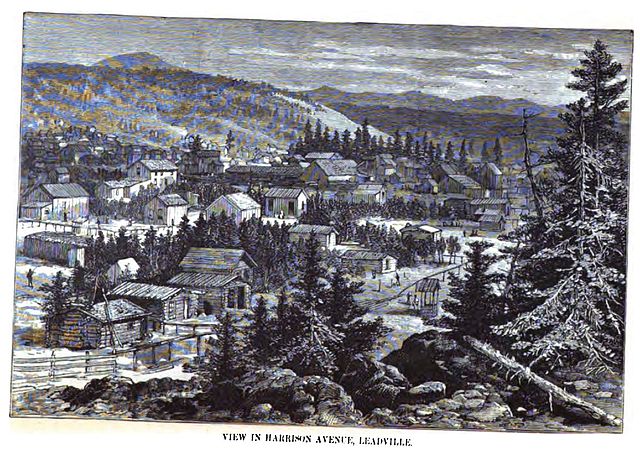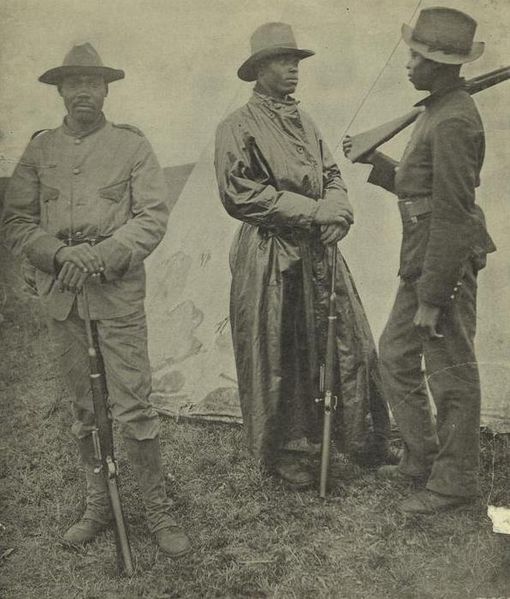 Review and interview
Review and interview
Some make a killing
while some just get killed in this western mystery set in Leadville, Colorado,
during the silver rush of 1879-1880. And the mysteries multiply after the
novel’s central character, a saloon owner, finds there’s a body in the frozen
mud outside her alley door.
In the pages of this
novel, author Ann Parker has persuasively created a whole social world sprung
into being by the discovery of silver in the Rocky Mountains. Inez Stannert and
her partner, Abe Jackson, keep the beer and whiskey flowing at the Silver Queen
for everyone from the silver barons to the Cornish miners who labor
underground.
At the novel’s
start, Bridgette O’Malley is the cook in the kitchen supplying bread and stew. And
on Saturday nights, the town’s leading citizens gather for a game of
high-stakes poker, with Inez dealing the cards. However, a third partner in the
business, Inez’ husband, has gone missing for most of a year.
 |
| Leadville, Colorado, c1880 |
Plot. The death of an apparently decent and trustworthy
assayer is passed off as an accident by the town’s truculent marshal. But it
leaves Inez more than a little curious, especially when the man’s office has
been broken into and ransacked. Something suspicious is going on in town, and
she is determined to find out how it came to have fatal consequences for the
assayer.
The mystery deepens
as we meet more characters. A newcomer to town, the Reverend J. B. Sands,
raises a number of questions as he seems unusually worldly for a man of the
cloth. Thoroughly handsome, he is also something of a lady-killer, and Inez
finds herself being romanced by the man.
Romance. Male readers unused to romance fiction will
find the story shifting into quite another key as Rev. Sands and Inez flirt
with intimacy and then yield to it. Love scenes are way different when told
from a woman’s point of view. There’s maybe nothing in fiction more revealing
of the gender gap.
For one thing,
romance emerges from a field of sexual politics in which men are used to
dominating and—especially in the frontier West—outnumbering women. Hollis, the
town marshal, is an extreme example, openly hostile to women. Sands, by
contrast, is a smooth operator, and there’s some question whether his real
motives might be sharply at variance with his polished manner.
Intimacy requires
both trust and surrender. When it leads to unmet expectations and fear of
betrayal, there is a heavy debt of injured pride. That leads to stormy scenes
between mismatched lovers, and this novel has its share of them.
 |
| Street scene, Leadville |
Themes. Injured pride may well have been the title of
the novel, as it runs as a theme from beginning to end. Discussing Milton’s Paradise
Lost, one character describes
the fallen angel, Lucifer, as the victim of it. And injured pride is a
condition that sooner or later gets most of the novel’s characters into
difficulty, including Inez.
The wintry weather
is another constant theme in the novel, as characters trudge through the town’s
frozen streets. Snow is forever falling, and we are often reminded of the cost
to the hems of full-length skirts as women navigate the sludge and mud-caked
walks.
An after-Christmas
soiree at one of the town’s hotels offers a welcome reprieve from the weather.
The chapters describing this elegant event are a genuine pleasure, from the
Eden-like greenery and the invited guests in evening dress to the string
quartet enthusiastically mangling Vivaldi and Mozart. For contrast, there’s the
overheated and dimly lit interior of the town’s high-class whorehouse.
 |
| Snow, Leadville, August 1882 |
Women. Parker picks as a point of view character a
woman who would have the freedom and independence of few other women on the
frontier. As a saloon owner, she is freer to mingle with the rougher elements
of town and much less constrained by the requirements of respectability.
Still, as a woman,
she deals with being openly stared at by ill-mannered men, and she is also
vulnerable on the worst streets of town. Thus, she carries firearms, sometimes
concealed, sometimes not. For anonymity, she sometimes dresses as a man. This
gets her access at night to a whorehouse, where she is in search of information
from one of the prostitutes.
She is also not
answerable to the most exacting dictates of Victorian morality. Having Abe
Jackson, a black man, as a business partner would have raised eyebrows among
readers of frontier fiction 100 years ago. Her affair with Rev. Sands would
have absolutely shocked them. A married woman tempted to extramarital sex—and
with a man of God—would have branded her as a “fallen woman.” The thrills she
feels when being touched by him and her awareness of his body in and out of his
clothes would have branded her as wanton.
On a scale of
relative iniquity, however, Parker places her heroine well above the brazen
madam of the town’s classiest “parlor house.” She also ranks above the coolly
arch proprietor of yet another whorehouse, in Denver, who smokes cigarettes as
she discusses the finer points of her trade and her customers.
 |
| Prospectors crossing a stream |
Style. The tone is straightforward throughout, with
an undercurrent of suspense, as the stakes rise and the threat of malice
escalates. Now and again there comes an outburst of graphic violence. In the
end, as an element of psychopathology is unmasked and takes over, the violence
gets pretty nasty.
The novel has a
Dickensian cast of characters, including the surprising appearance of none
other than Bat Masterson. There are a couple moments of humor, as when the Rev.
Sands enters the saloon and Inez hears the newly hired piano player segue into
“What a Friend We Have in Jesus.” And one of her employees, a back-bar flunky
named Ulysses, is called “Useless” by everyone.
The mystery itself
is densely plotted, and so many unanswered questions and speculations crop up
that even a seasoned mystery reader may well feel bewildered. At the end, a life-threatening
crisis takes the focus, leaving several details unexplained. Finally, there’s
been so much going on that it takes a couple of chapters of denouement to sum
it all up, including the romantic subplot.
Wrapping up. Overall, Silver Lies is enjoyable on many levels, particularly for
its portrayal of a booming frontier mining town, crawling with life 24 hours of
the day. It was first published in 2003 by Poisoned Pen Press and has recently
been released as an ebook. It is currently available at amazon and
Barnes&Noble for kindle and the nook, also at Powell's Books and Abebooks. You can visit Ann Parker’s website here.
Interview
 |
| Ann Parker, Photo by Charles Lucke |
Ann Parker has generously agreed to spend some time at BITS today answering questions about the writing of Silver Lies. I'm happy to turn the rest of this post over to her.
Talk about how the idea for this novel suggested itself
to you.
Silver Lies, and
indeed all the novels that follow, evolved out of a desire to explore this
particular area of Colorado—Leadville in particular—during a specific time—the
boom years of the Colorado Silver Rush. When I first became interested in this
timeframe of Colorado history, we were deep into the dot-com boom here in
California, and I was intrigued by the psychological and economic parallels
between these particular “get-rich-quick” times of vast enthusiasms and
optimism that, to some extent, flies in the face of reality.
Only a few ever rise from rags to riches in any given
boom… but many who fall under the spell of overnight success get swept up in
the hope that, despite the numbers to the contrary, THEY will be one of the
lucky ones. Then, there are the pragmatic types who see the golden opportunity
in feeding the dreams… The folks in Leadville, for example, who “mined the
miners.”
Did the story come to you all at once or was that a more
complex part of the process?
The story evolved as I wrote the first draft. When I
pondered the possibility of writing a book, the opening scene came to me in a
flash and with a feel in my gut: Here is the beginning. I had no idea why
assayer Joe Rose was in such a fix or what he was doing in one of the nastiest
back street alleys in Leadville’s red-light district in the darkest hour of a
cold winter night, nor who was out to get him.
My writing process… particularly for this first book… was
akin to driving in the night with the headlights on. Every chapter I wrote
illuminated the next. It wasn’t until the final third of the book that I could
see to “the end.” At that point, I grabbed a little yellow sticky note—about
two inches square—and scribbled down a handful of key scenes I needed to finish
the story. That was as close to an outline as I got for Silver Lies.
Talk a bit about editing and revising. After completing
a first draft, did it go through any key changes?
Oh my yes. Since my initial writing process was one of
discovery and I wasn’t following a pre-set outline or story arc, my first draft
was massive: about 160,000 words (600+ pages). I was told that, for it to be
marketable, I had to shrink it down. A lot.
I threw out subplots, stripped out characters that didn’t
forward the story, and added another suspect or two (because, despite its
length, I really didn’t have enough suspects). I also worked on paring down the
language. I tend to be very wordy in my first drafts—channeling the 19th
century, perhaps. Even after all this, the end result is still pretty long as
far as first novels go: over 110,000 words.









_-_La_Nuit_(1883).jpg)












